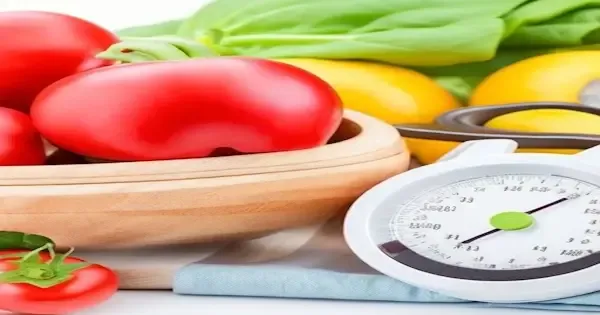High Blood Pressure Diet
High blood pressure, medically known as hypertension, is a prevalent condition that significantly increases the risk of heart disease, stroke, and other health complications. While medical treatments play a crucial role in managing high blood pressure, adopting a well-balanced diet can be an equally potent approach. This article delves into the essential aspects of a high blood pressure diet, guiding you through foods to include and avoid, backed by the latest scientific insights.
 |
| High Blood Pressure Diet |
Table of Contents
- Introduction
- Key Benefits of a High Blood Pressure Diet
- Foods to Include
- Foods to Avoid
- Effective Meal Planning
- FAQs about High Blood Pressure Diet
- Conclusion
Introduction
A high blood pressure diet focuses on reducing sodium intake and increasing consumption of nutrient-rich foods that support cardiovascular health. This dietary approach aims to lower blood pressure levels and minimize strain on the heart and arteries. With hypertension affecting millions worldwide, embracing dietary changes can play a pivotal role in managing this condition.
By incorporating specific foods and making informed choices, individuals can positively influence their blood pressure levels and overall well-being. In the following sections, we will explore the key components of a high blood pressure diet, providing practical insights to help you make healthier food choices.
Key Benefits of a High Blood Pressure Diet
Adopting a high blood pressure diet offers a multitude of benefits for your cardiovascular health:
- Promotes Healthy Blood Pressure: A diet rich in potassium, magnesium, and fiber can contribute to lower blood pressure levels.
- Supports Heart Health: Nutrient-dense foods like fruits, vegetables, whole grains, and lean proteins contribute to a stronger heart.
- Reduces Sodium Intake: Lowering sodium consumption helps prevent water retention and eases pressure on blood vessel walls.
- Manages Weight: A balanced diet aids weight management, reducing the risk of obesity-related hypertension.
- Enhances Circulation: Antioxidant-rich foods improve blood flow and reduce inflammation in the arteries.
Foods to Include
When building a high blood pressure diet, prioritize the following foods:
- Fruits such as berries, bananas, oranges, and melons, which are excellent sources of potassium and antioxidants.
- Vegetables like leafy greens, carrots, bell peppers, and broccoli, packed with vitamins, minerals, and dietary fiber.
- Whole grains such as quinoa, brown rice, oats, and whole wheat products, promoting heart health and digestion.
- Lean proteins including skinless poultry, fish, tofu, and legumes, supporting muscle growth without excess saturated fat.
- Low-fat dairy or dairy alternatives rich in calcium and vitamin D for maintaining strong bones and overall health.
- Healthy fats from sources like avocados, nuts, seeds, and olive oil, contributing to heart health and satiety.
Foods to Avoid
To effectively manage high blood pressure, it's essential to limit or avoid the following:
- Excessive Sodium: Minimize high-sodium foods like processed snacks, canned soups, and fast food to control blood pressure.
- Trans Fats: Avoid partially hydrogenated oils often found in fried foods and commercially baked products.
- Added Sugars: Reduce consumption of sugary beverages, sweets, and desserts to maintain a healthy weight and blood pressure.
- Processed Meats: Cut back on sausages, bacon, and deli meats high in sodium and unhealthy fats.
- Alcohol: Consume alcohol in moderation, as excessive intake can lead to increased blood pressure levels.
- Caffeine: While moderate caffeine intake is generally safe, excessive consumption can temporarily elevate blood pressure.
Effective Meal Planning
Creating well-rounded, blood pressure-friendly meals can be straightforward with the right approach:
- Use Herbs and Spices: Flavor dishes with herbs and spices instead of salt to enhance taste without adding sodium.
- Monitor Portion Sizes: Be mindful of portion sizes to prevent overeating, which can lead to weight gain and higher blood pressure.
- Read Labels: Scrutinize nutrition labels to identify hidden sodium, sugar, and unhealthy fats in packaged foods.
- Stay Hydrated: Drink plenty of water to maintain hydration and support overall cardiovascular health.
- Plan Ahead: Prepare meals at home whenever possible, allowing you to control ingredients and cooking methods.
FAQs about High Blood Pressure Diet
Is caffeine consumption safe for individuals with high blood pressure?
Moderate caffeine intake is generally considered safe for most people with high blood pressure. However, excessive consumption can lead to temporary blood pressure spikes. It's advisable to monitor your body's response and limit caffeine if you notice any adverse effects.
Can I enjoy occasional treats while following a high blood pressure diet?
Occasional treats can be enjoyed, but it's important to consume them in moderation. High-sugar and high-sodium treats should be limited, as they can counteract the positive effects of a balanced diet on blood pressure and overall health.
Are all fats off-limits in a high blood pressure diet?
No, not all fats are off-limits. Healthy fats, such as those found in avocados, nuts, and olive oil, are actually beneficial for heart health and should be included in moderation. These fats can help lower bad cholesterol levels and reduce the risk of heart disease.
How quickly can I expect to see results from dietary changes?
Individual responses to dietary changes vary, but many people experience positive effects within a few weeks to a few months. Consistency is key, and combining a balanced diet with regular physical activity and stress management can accelerate results.
Conclusion
Embracing a high blood pressure diet empowers you to take control of your cardiovascular health. By incorporating nutrient-rich foods, making smart choices, and avoiding excessive sodium and unhealthy fats, you can work towards maintaining healthy blood pressure levels and reducing the risk of associated complications.
Remember that a high blood pressure diet is just one component of an overall healthy lifestyle. Regular exercise, stress reduction, and medical guidance are equally vital in effectively managing hypertension. With dedication and informed choices, you can pave the way for a heart-healthy future.


